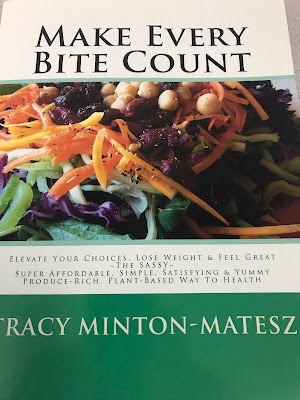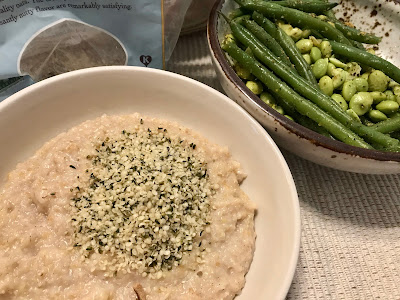The SASSY Vegan Diet That's Sustainable Can Include Oils! Part 1
What is a SASSY Vegan diet, and what makes it sustainable?
That's the question I will address in this series about creating a healthy plant-based vegan diet that can be enjoyed and sustained for life, beginning with the topic of fats and oils in this, part 1.
First off, what do I mean by SASSY?
 |
| MEBC will be available as a FREE E-book soon! |
SASSY was an acronym I coined to represent a style of eating that I believed would be more sustainable. It was part of the subtitle for my flagship book, Make Every Bite Count, Elevate Your Choices, Lose Weight & Feel Great ~ the SASSY ~ Super Affordable, Simple, Satisfying & YUMMY Produce-Rich, Plant-Based Way to Health.
A super affordable, simple, satisfying and yummy ~ SASSY vegan diet will be far more sustainable as well.
Although I completed T.Colin Campbell's Plant-Based Nutrition Certification in 2012, and the Forks Over Knives oil-free cooking course through Rouxbe Online Cooking School in 2023 ~ both of which I greatly enjoyed ~ I personally prefer a more flexible approach to eating a plant-based diet.
Further, regardless of my personal preferences, I believe simplicity and flexibility are key to attracting people to a more plant-dominant or even fully vegan diet and lifestyle.
Too often, it seems that perfection becomes the enemy of the good.
I certainly have huge gratitude and respect for the tremendous contributions made by several plant-based doctors. Reading many of their books ~ including The McDougall Plan, The Starch Solution, Digestive Tune-Up (and others) by Dr. John McDougall; Dr. Neal Barnard's Program for Reversing Diabetes, Power Foods for the Brain, Your Body in Balance, and several others by Dr. Neal Barnard, along with Dr. Esselstyn's book chronicling his study helping patients with advanced heart disease in Prevent and Reverse Heart Disease, and The Engine 2 Diet, written by his son, an accomplished vegan triathlete, and creator of the Plant Strong line of foods, all influenced our decision to adopt (and restore) a vegan diet, which I touch upon in my previous post.
T. Colin Campbell's groundbreaking China study, written about in his book, The China Study, and featured on the documentary Forks Over Knives, followed by Whole: Rethinking the Science of Nutrition, by T. Colin Campbell were especially influential in our decision to go vegan in hopes of resolving my own troubling breast condition.
Nonetheless, I don't agree with 100% of their dietary recommendations. And, that's ok! I still highly recommend each of these books, including to many of our acupuncture clients.
As practitioners of Chinese medicine, Don and I have a somewhat different frame of reference for determining which foods are best for health. We tend to be gun shy of blanket, one-size-fits-all approaches, such as the agreed upon recommendation by all of the above doctors and authors to strictly avoid plant oils, and in many cases, greatly limit plant fats in general.
The devil, as they say, is in the details, or, the dose makes the poison.
I understand why Dr. McDougall and Dr. Esseylstyn make the recommendations they make, as they were (and still are) dealing with many patients with chronic diseases, whether advanced heart disease, diabetes, cancer, and/or obesity, hence their recommendations to avoid all oils, and even limit nuts, seeds, tofu and other higher plant foods makes sense.
People in poor health who are very over weight, or trying to correct / reverse chronic disease may need to more strictly adhere to a no oil, low-fat, whole-foods, plant-based diet. (I'll be looking at the notion that all foods should be 'whole' in the next part of this series.)
That doesn't mean that everyone adopting a plant-based diet ~ including those in good health ~ needs to eliminate all oils, and limit fats in general in order to be healthy. Research does not support these claims.
 |
| I highly recommend this book! |
In Vegan For Life, authors Jack Norris and Virginia (Ginny) Messina, both registered dietitians state:
"Despite the popularity of vegan diets that eliminate all high-fat foods, the evidence for the benefits of this approach is limited. It's true that compared to usual Western eating habits its, low-fat vegan diets offer advantages for health. But there is no evidence that they provide benefits compared to higher-fat plant-based diets."
Continuing, they discuss how Ancel Keys and his colleagues found that the countries with the lowest risk for cardiovascular disease were among people living on the Greek island of Crete, eating a plant-dominant diet, rich in healthful fats. They discovered that some types of fat, such as nuts, have beneficial effects on blood cholesterol levels, can protect against heart disease and may aid in weight management.
The key to enjoying a healthy SASSY Vegan Diet is to find the right balance of both macro and micro nutrients, which, counter to some people's claims, does require a bit of planning.
Fats Improve Absorption of Fat Soluble Nutrients
 |
| Carrot & Low-Acid, Orange Tomato Soup |
 |
| Carrot, Apple, Ginger Blended Drink |
As Norris and Messina state, "While some vegans prefer and thrive on lower fat intakes, these diets are not the right choice for everyone. Eating diets that are very low in fat could be the reason that some people abandon vegan diets and return to eating meat."
Further, "Many people think of meat as "protein," forgetting that meat is also typically high in fat. Those who don't feel well on vegan diets sometimes add meat back to their diet because they're convinced that they aren't getting adequate protein––when, in fact, they might have felt better by simply adding more fat to their menu."
PUFAs Help Lower Cholesterol and Reduce Risk for Heart Disease
The primary types of fats found to be the most effective for lowering blood cholesterol levels, and are associated with reduced risk for heart disease, are polyunsaturated fats. Polyunsaturated fats, or PUFAs are found in seeds, walnuts, soy foods, and many vegetable and seed oils. Of these, two types of fatty acids are essential. Linoleic acid (LA) is an omega-6 fat, found in many plant foods, and alpha-linolenic acid (ALA) is the essential omega-3 fat, for which the best plant sources includes flax, chia and hemp seeds, and walnuts.
While it has become commonplace to blame common modern diseases including cancer and heart disease on the increased consumption of PUFAs and seed oils in the Western diet, according to Norris, Messina and others, there is a lack of evidence to support these claims.
Dr. Gil Carvalho of Nutrition Made Simple on YouTube has posted videos highlighting several studies done on the health effects of seed oils, including canola oil, and found no clear reason for which these oils need to be eliminated from the diet.
I've posted this before, but this video investigates if seed oils are inflammatory:
This video looks at studies of canola oil:
All this said, oils are not a requirement for a healthy, SASSY vegan diet, providing one is consuming adequate amounts of plant fats to meet nutrient needs, and improve absorption of fat soluble nutrients. The total amount of fat that helps someone thrive, without over eating high-fat foods and inadvertently gaining excess body fat will vary from person to person.
Oils are considered highly beneficial in Ayurvedic medicine for someone with a more dry, Vata dominant constitution, such as myself. Foods like beans and legumes which are considered astringent, can exacerbate an already dry condition in Vata types. Likewise, bitter greens which are drying are balanced with the addition of oils, seeds, or nuts. Contrarily, a Kapha type with a tendency to easily gain excess body fat may need to be more restrictive with oils and fatty plant foods. (You may be interested in my article, How to Minimize Gas and Bloating ~ sharing our Vata reducing food choices & cooking techniques.)
Don and I find the dietary guidelines from Chinese medicine, Ayurvedic medicine, and to a lesser extent, macrobiotics, to be more intuitive and nuanced. These approaches do not make one-size-fits-all recommendations, nor considers foods as either inherently 'good' or 'bad.' Rather, they recommend foods according to individual needs, based on the inherent properties of each food.
If someone tends to be hot natured, for example, warming, hot foods and herbs (such as fried fatty foods, pungent spices and herbs), would be off the menu, while more cooling and neutral foods (such as many fruits and vegetables, more raw foods), would emphasized.
Contrarily, someone who is always cold, or has premenstrual cramps would want to emphasize warming and invigorating foods and herbs, like cinnamon and ginger, mostly cooked foods and warm or hot beverages, while avoiding ore minimizing cold, raw foods, big smoothies, iced drinks, etc. (Find all my articles about Chinese Food Therapy and Five-Elements, here.)
It's precisely the flexibility that is the hallmark of a SASSY vegan diet that encourages people to make personally appropriate choices that they can enjoy and sustain in good health.
Generally speaking, a SASSY Vegan Diet that's Sustainable will include at least 20% of total calories from fat. Less than 20% would be recommended only for those who feel better following a very low-fat diet, or as a therapeutic diet when needing to lose weight and / or reverse advanced cardiovascular disease, diabetes, and other chronic diseases.
If preferring to get your fat needs met from whole plant fat sources, that's great.
If you enjoy the added flavor or improved digestibility of adding some oil to your greens and vegetables, or for use in cooking, do so mindfully, making sure to not just pour olive oil all over your salad with abandon.
As Messina and Norris state, "Just a little bit of oil can make flavors pop and also enhance nutrient absorption."
 |
| Hemp seeds on porridge, and/or high lignan flax oil on greens & vegetables are a great source of omega-3 rich fats |
Eating a healthy, SASSY vegan diet ~ or any dietary style for that matter ~ requires some amount of planning and wherewithal. Although we all love the idea of eating all we want, and not feeling restricted, careful planning, knowledge, and self-discipline is what delivers results.
The very reason I am writing these posts is because it's very easy to become caught up in all the nutritional information being spread on social media platforms. Many people make claims that may sound good, but are not backed up by evidence.
To create a healthy, balanced SASSY vegan diet that is sustainable for your needs, question everything! Do some research, and look for those who are not promising you perfect health when you follow their way of eating, nor making blanket statements with an air of authority, without being open to contrary data.
Be like water, as Bruce Lee often said.
To be SASSY, you need to keep an open mind, and think out of the box.
Listen, research, experiment, and make a SASSY vegan diet that works for you, that you will enjoy, and more importantly, you can sustain, for life.




Comments
Post a Comment
Let me know what you think! I'd love to hear from you!